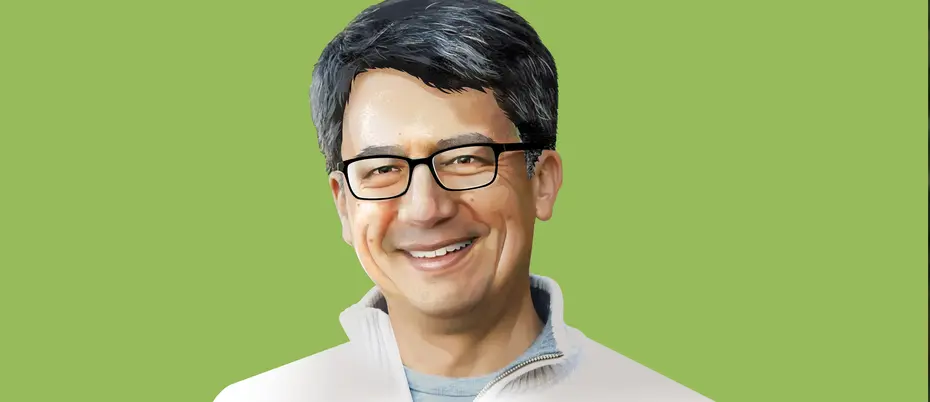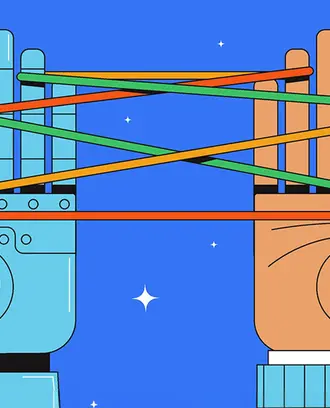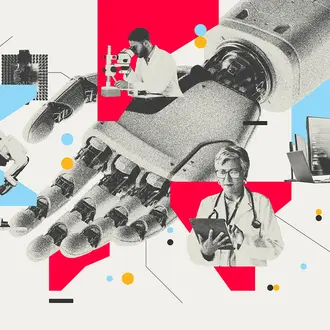Leadership
How this ‘private sector head and public sector heart’ sees ideas
Mark Giordono draws management lessons from his family life, and idea inspiration from the students at the heart of his STEM nonprofit.
When Mark Giordono arrived at the Malian village where he’d be serving as a Peace Corps volunteer in western Africa, he brought millet seeds and a misguided idea.
“I assumed I could show up and give farmers some new and improved millet seed and expect them to plant that instead of their heirloom varieties,” Giordono said. “Everyone politely smiled, took the seeds, and then quietly later fed them to their chickens. Just like anywhere else, it turns out you need some credibility, trust, and an understanding of the environment before you get an opportunity to offer up a new idea.”
Giordono took that life lesson with him, and today applies it to his role as vice president of development and alumni relations at For Inspiration and Recognition of Science and Technology (FIRST), a nonprofit that designs programs to encourage students to explore STEM education, such as using LEGO bricks to teach design and engineering skills.
We spoke with the 2002 MBA grad about using the private sector to meet public sector goals, tapping FIRST’s local and worldwide ecosystems for ideas, and more.
What inspires you?
Knowing there’s so much potential for human innovation to make new, good things for the world.
Who inspires you?
The kids in FIRST programs. They’re a great reminder that everyone is naturally innovative when given the right tools and the confidence to be creative. They haven’t yet learned and become burdened with the baggage, constraints, and limitation of the “real world.”
Where do you get ideas?
From anywhere I can. The challenge for me is being aware of and receptive to ideas coming from other people, from a book I read, a tweet I scrolled past, from something I saw while out hiking.
How are new ideas discovered and developed in your organization?
Honestly? We’re not always the best at recognizing and developing new ideas. Like many organizations, we have antibodies that reflexively resist new things. That said, the best new ideas come from our worldwide network of local affiliates. They’ll try out something new in their local market and in the best cases we recognize, help adapt, develop, and disseminate those ideas across the entire FIRST ecosystem.
How do you keep track of new ideas?
Nothing formal. If it’s a good idea, it naturally stays top of mind or seems to resurface at just the right moment.
When do you know it is time to abandon an idea?
I don’t think you ever completely abandon an idea, but rather put it on a shelf until situations change and the idea becomes relevant again.
How do you know an idea is a good one?
Usually only after the fact, when it’s taken for granted and seems so obviously true and it’s hard to remember the alternatives.
What's the biggest idea you are working on right now?
I’ve always been a bleeding-heart do-gooder and generally good at business. Someone described me as having a “private sector head and public sector heart.” My day job as an executive in the nonprofit world basically involves taking significant corporate resources and putting them to work toward social impact goals.
The big idea I’m wrestling with now is whether the voluntary investments corporations make in “doing good” are meaningful enough to save the world; whether the private sector today can truly move the needle on public sector goals.
I’m struggling with the Business Roundtable’s proclaimed “Purpose of the Corporation” and the realities of how business is actually done. My big idea would be finding a way to reconcile it all.
At MIT Sloan, we talk about ideas made to matter — ideas that are carefully developed and have meaningful impact in the world. In that context — what is your idea made to matter?
As is the case in most of my industry, I’m a male executive in a predominately female organization. The recent blurring of home and work lives highlighted to me the value of acknowledging and leveraging my vulnerability around being a parent and a professional.
I’ve become a better parent to my children by setting clearer goals, asking for feedback and assuming positive intent in their words and actions. I’ve become a better leader of my teams by having high expectations, demonstrating more empathy, and providing almost unlimited second chances. I can’t fire my kids nor give my staff time outs, but otherwise letting my worlds blend and getting the results of parent leadership is an idea that matters for me.




